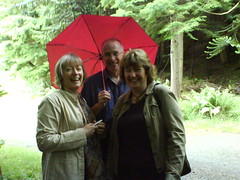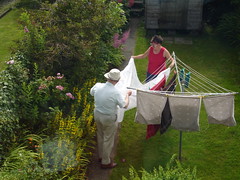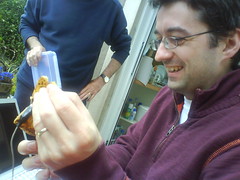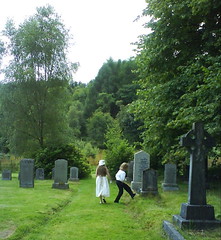There’s been quite a conversation going on over at
Kelvin’s blog about more than what the Episcopal Church produces in the way of downloadable liturgies. It boils down, I suppose, to whether or not people are put off a church if they have more than one item of reading matter to cope with in a service – or if they have problems finding their way around a liturgy book. And then there’s the side issue of the proper use of clergy time.
Rather than burst into personal reminiscence on someone else’s blog, I thought I’d do a bit of ruminating here, in my own space. And that’s all this is – not a criticism, not a battle-plan, but a thinking session.
So. Think back. I wasn’t always a Piskie. I was brought up in what might best be described as liberal/sceptical Presbyterian surroundings, with a Hebrew scholar in ancient clerical collar as a great-uncle and a father who had been so sickened of church in his youth that he would describe himself as a buttress rather than a pillar of the kirk – good for other people, but not for him. The transition for me was provided by music, by singing Byrd and Palestrina in the
Cathedral of The Isles – and being taught to cook by the aged Dean, George Douglas, who talked while I skivvied for his eccentric culinary activities.
The first time I sang Evensong for a week in our quartet, The St Maura Singers (still going strong and giving a recital in the Cathedral on 30 September) I was lost. Every service was a time of anxious thumbing through the prayer book, checking where the music for the Mag and Nunc had hidden itself, worrying about where the Psalm was in the green (plainsong) psalter, trying not to let the anthem fall on the tiled floor in front of the choir stalls for all the world (all five of them) to see. By the Criteria of the Cumbersome Bookies, I should have been put off for life. Remember – at this point I’m a heathen, only there for the music. But I was fascinated. I used to borrow a copy of the 1929 Prayer Book and read it. The language entranced me, and the power of having all these words for every occasion was revelatory. I would read Compline to myself, aloud. I was well on my way to being a Piskie groupie – all without any real faith in what was on offer.
The story of what changed all that isn’t relevant here – suffice it to say that I fell off my donkey at Dean Douglas’ requiem mass and have never been the same since. But ever since then, in choirs and as a member of a congregation, I have been accustomed to juggle liturgy books, leaflets, music for settings, music for anthems and occasionally two hymnbooks if the music was not on the same page as the words of a particular hymn. And I was never alone in this – a choir of children aged 6 – 16 coped fine, and came back for more, often without any background in our church at all.
So what has changed? Are we really worrying about the effect on seekers of no church background? Or are we thinking about visitors from another church who have no real intention of staying with us and who are bound to make comparisons with what they are used to? Because if someone is really drawn to Episcopal worship, what they are used to when they finally fall off their donkeys will be part of the experience – and no fiddling around with making things more convenient is going to matter two hoots.
There’s more I want to say about the role of clergy in helping the donkeys, but I think that’ll have to wait for another time. So I’ll confine myself to a final observation. When I returned to teaching English in 1982 after a break of 8 years, I found that pupils expected much more in the way of handouts and spoonfeeding than I had been used to in my first post. They were unwilling to look stuff up for themselves, preferring to be given reams of typescript which they could then stuff into a folder. To the end of my career I resisted this as far as possible, knowing that if pupils made the notes for themselves they would be far more likely to recall what they had written. Indeed, I often suspected that they wouldn’t really read handouts, and frequently returned them in a relatively pristine condition at the end of the course.
Maybe there is a generation who indeed can’t cope with a book or two. Me, I can’t cope with bits of paper – a glance at my desk proves this. Besides, no-one ever prints alto parts on service sheets.
 I referred the other day to the circumstances under which I fell off my donkey – realised the truth that lay behind the liturgy I was involved in, the prayers and music which had become familiar because I was a church musician. And perhaps you could argue that I was thus affected by music – which yes, I believe to be God’s highway, a powerful agent for conversion. But I believe there was more to it, and that this “more” has continued, alongside music, to inspire and develop my own spiritual journey.
I referred the other day to the circumstances under which I fell off my donkey – realised the truth that lay behind the liturgy I was involved in, the prayers and music which had become familiar because I was a church musician. And perhaps you could argue that I was thus affected by music – which yes, I believe to be God’s highway, a powerful agent for conversion. But I believe there was more to it, and that this “more” has continued, alongside music, to inspire and develop my own spiritual journey.














